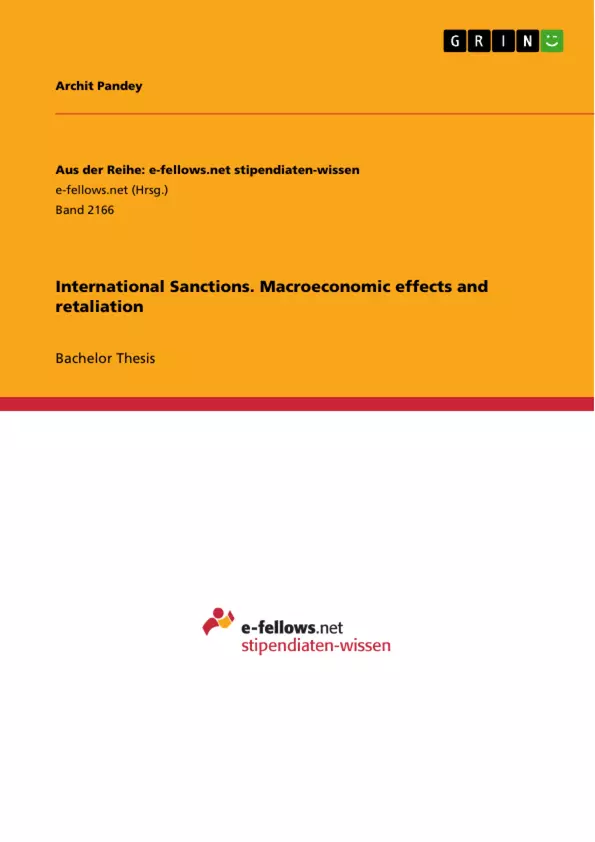In various instances, countries, regional organizations, and the United Nations have resorted to the use of sanctions as a foreign policy, as a tool for geopolitics, in order to influence the behavior of targeted states. Numerous researches and analyses have been conducted to observe and understand the effectiveness and impact of sanctions, and subsequently dismissed them as either effective, ineffective, or counterproductive to their intended objectives.
This dissertation seeks to address the aforementioned question; in particular, whether sanctions remain to be an option as a geopolitical tool to influence the behavior of targeted states? The core of this dissertation consists of three case studies: first, sanctions on Russian Federation (2014-present); sanctions on Iran (1979 – present, 2006, 2012 – 2016); and, US trade embargo on Cuba (1960 – present). These case studies have been analyzed from the structural point of view to understand its specifics, background, and plausible retaliation by the state. Then, the technical results achieved by the sanctions are reviewed, and their weaknesses are highlighted. Lastly, numerous relevant arguments are provided to reinforce the conclusion.
Inhaltsverzeichnis (Table of Contents)
- Introduction
- What are sanctions?
- Different types of sanctions
- Why do we need sanctions?
- Methodology
- Case study: Russian Federation
- Background
- Pro-Russian unrest and Russian military intervention in Ukraine.
- Crimea and Russian military intervention.
- Sanctions and their extent
- Russian political response.
- Analysis
- Falling Ruble and Central Bank intervention
- Housing market
- Retaliation and Conclusion
- Case study: Islamic Republic of Iran
- Background
- EU-UN led sanctions: Background
- Aftermath and impact
- The Oil Economy
- Economic Growth amidst sanctions
- Currency fluctuations
- Conclusion
- Case study: Republic of Cuba
- Background
- Impact
- Current scenario
- Conclusion
- Arguments for effectiveness of sanctions
- Survey: Domestic perception on effect of sanctions
- Final words
Zielsetzung und Themenschwerpunkte (Objectives and Key Themes)
This dissertation analyzes the effectiveness of international sanctions as a geopolitical tool to influence the behavior of targeted states. It examines the impact of sanctions on the targeted countries' economies and explores the possibility of retaliation. The study focuses on three case studies: Russia, Iran, and Cuba.
- The effectiveness of international sanctions as a geopolitical tool.
- The impact of sanctions on the targeted countries' economies.
- The possibility of retaliation against sanctions.
- The structural specifics, background, and plausible retaliation of sanctions.
- The technical results achieved by sanctions and their weaknesses.
Zusammenfassung der Kapitel (Chapter Summaries)
The introduction defines sanctions and explores their different types and reasons for implementation. The methodology chapter outlines the research approach used for this study. The case study on Russia examines the sanctions imposed following the annexation of Crimea and the subsequent impact on the Russian economy. The case study on Iran explores the long-standing sanctions against the country and their effects on the Iranian economy. The case study on Cuba analyzes the US trade embargo and its impact on the Cuban economy.
Schlüsselwörter (Keywords)
This dissertation focuses on international sanctions, trade, embargo, economics, geopolitics, and retaliation. It examines the impact of sanctions on targeted countries' economies and analyzes the effectiveness of sanctions as a geopolitical tool. The study explores the specific cases of Russia, Iran, and Cuba.
Frequently Asked Questions
What is the main objective of this dissertation on international sanctions?
The dissertation analyzes the effectiveness of international sanctions as a geopolitical tool to influence the behavior of targeted states and examines their macroeconomic impacts.
Which case studies are analyzed in this research?
The study focuses on three specific cases: sanctions on the Russian Federation (2014-present), sanctions on Iran (various periods since 1979), and the US trade embargo on Cuba (1960-present).
How does the author define the effectiveness of sanctions?
Effectiveness is reviewed through technical results achieved, structural specifics of the targeted state, and whether the sanctions successfully influenced the state's behavior without being counterproductive.
What specific economic impacts on Russia are discussed?
The dissertation examines the falling Ruble, Central Bank interventions, and the impact of sanctions on the Russian housing market.
Does the dissertation address the possibility of retaliation?
Yes, it analyzes the structural specifics and background of targeted states to understand plausible retaliation against international sanctions.
What are the different types of sanctions mentioned?
The text explores various types including trade embargoes, economic restrictions, and geopolitical tools used by the UN and regional organizations.
- Quote paper
- Archit Pandey (Author), 2016, International Sanctions. Macroeconomic effects and retaliation, Munich, GRIN Verlag, https://www.grin.com/document/343359



